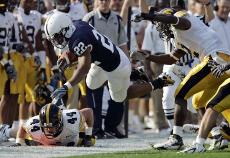Iowa coach Ferentz remains optimistic despite down year

Oct 12, 2007
Last updated on May 12, 2016 at 05:09 p.m.
IOWA CITY, Iowa – In the summer of 2006, Iowa kept Kirk Ferentz away from the NFL by making him one of the nation’s highest-paid coaches.
The Hawkeyes haven’t gotten much bang for their buck.
Iowa (2-4, 0-3 Big Ten) hasn’t won a Big Ten game in over a year and is in danger of missing out on a bowl for the first time since 2000. The program’s recent woes have raised questions about how a coach making close to $3 million a year can let his team fall so quickly from national relevance.
Granted, nobody’s talking about firing Ferentz – save for a few fans with short memories. But Iowa, ravaged by injuries and a woefully inept offense, have lost eight straight Big Ten games and carry a losing streak of four overall into Saturday’s tilt with No. 18 Illinois.
Get The Daily Illini in your inbox!
“Where we’re at right now is not where we wanted to be certainly. It wasn’t by design. But nobody is panicking here, and I don’t think anybody in our house is at least on the ledge. I hope not,” said Ferentz, who led Iowa to Big Ten titles in 2002 and 2004 and became one of the hottest coaching prospects in the country. “We’re just going to work through it.”
Injuries have taxed the Hawkeyes’ depth, which, despite strides in recruiting over the past four years, still pales in comparison to Big Ten heavyweights Ohio State and Michigan.
Iowa started 5-1 in 2006, before nagging injuries to key performers led to a 1-6 finish.
It’s only gotten worse this season.
The Hawkeyes haven’t been able to do anything on offense. They lost their top receiving threat, sophomore Dominique Douglas, in August after he was suspended and charged with unauthorized use of a credit card. Wide receiver Andy Brodell and tight end Tony Moeaki, who were 1-2 on the team in receiving yards in place of Douglas, both went down with injuries in the Big Ten opener against Wisconsin on Sept. 22.
Throw in an inexperienced and injury-plagued line and a first-year quarterback, Jake Christensen, throwing to a bevy of backup receivers, and it’s easy to see why Iowa’s offense is ranked 114th in the nation with just 17.3 points a game.
“When it comes to injuries, there’s absolutely no way to predict those things. When they occur, you just deal with them the best you can,” Ferentz said. “We’ve had years where we’ve sailed through pretty clean, and we’ve had other years where it’s been a little bit more challenging. It just makes the equation a little bit tougher to solve.”
That Ferentz is even hearing grumbling over the team’s direction is a marked change from the bulk of his tenure.
Some thought Ferentz was an uninspired choice to take over for the legendary Hayden Fry in 1999. Four years later, the Hawkeyes were one of the nation’s top programs.
Kinnick Stadium was sold out every Saturday, and Ferentz, The Associated Press National Coach of the Year in 2002, became a star. He was respected nationally for his coaching acumen and beloved locally for a humble, hardworking approach that produced big-time results.
Iowa began to slip in 2005, finishing 7-5 after three straight top-10 finishes. That didn’t stop the NFL rumor mill from churning out his name nearly every time a job became open.
In June 2006, former athletic director Bob Bowlsby stepped in and made Ferentz one of the richest coaches in college football, bumping his annual salary to $2.84 million.
Ferentz’s revised contract runs until 2012 and includes a hefty buyout. Athletic director Gary Barta, who took over for Bowlsby in August 2006, gave Ferentz and his staff a vote of confidence Thursday, adding that he doesn’t feel hamstrung by Ferentz’s contract.
“He’s a person who has demonstrated great success … he’s won championships, he handles his student-athletes, both academically and socially, the way we expect, in a first-class manner. He has integrity, he works hard,” Barta said. “That doesn’t mean our expectations have changed. When we struggle on the field, we’ve got to find a way to get better.”





